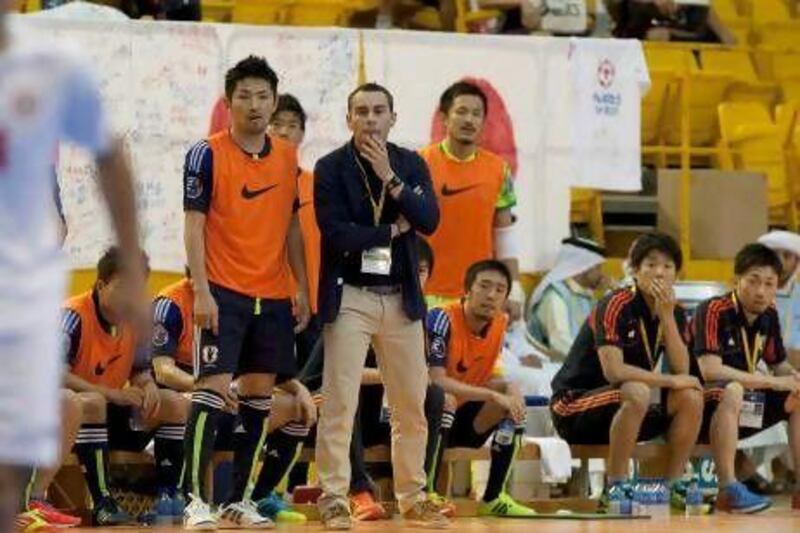Miguel Rodrigo has just finished reading Daniel Coyle's The Talent Code, which takes a look at nine of the world's hotbeds for developing athletic skills and tries to explain the reasons for their success.
One of the chapters in that book is on Brazil and its incredible success in football. Coyle, a journalist and best-selling author, found futbol de salao, or futsal as we know it, to be the primary reason.
"The ball is smaller and heavier - creating more control," Coyle said. "The field is tiny - putting a premium on vision, anticipation, and quick, accurate passes. The play is lightning-fast - forcing players to anticipate and adapt … futbol de salao uses deep practice to build skills at high velocity".
Rodrigo, the Japan national futsal team coach, agrees with Coyle's assessment and believes this is the trick that Asian football is missing.
The Spaniard, who spent six seasons as a player from 1986 before switching to coaching in 1992, is amazed to see the reverse cycle of football development being applied in this continent.
"If you have a 12-year-old kid, would you give him your size shoes to wear?" Rodrigo asked. "You will buy one that fits his feet, his size. So why then do we force children to play 11-a-side football?
"In Spain, Brazil, Portugal, these countries have the system to adapt football to the needs of kids. Futsal is the first step for them. Players like Raul, Iniesta, Xavi, Ronaldinho, Ronaldo, Neymar, Robinho they all started with futsal. Neymar played futsal until he was 14 years old.
"You will probably not find a single kid in Spain, Brazil or Argentina who has not played futsal before he starts playing football. It's almost obligatory for him to start with futsal.
"It's the opposite in Asia. Football players in their 20s or 30s start playing futsal. It is too late for them and very difficult."
According to Coyle's book, futsal "develops skill circuits far faster than the outdoor game" because the players "touch the ball more often - 600 per cent more often, according to one study. More touches - in other words, more circuit-firings - creates more skill".
"[The players] are forced to develop more moves," Coyle wrote. "Merely booting the ball down the field - often the first option in the outdoor game - doesn't work. Futbol de salao players practice lots of fakes and tricks - because they have to. As one Brazilian told me, 'Futsal is our national laboratory of improvisation'.
"[The players] grow accustomed to operating in tight spaces. When they get to the outdoor game, futsal players feel as if they have all the room in the world."
"So if you compare the two groups - one which has grown up playing futsal and the other who have been playing football - which one will be better," Rodrigo asked.
Knowing the virtues of the five-a-side game in development, Rodrigo is trying to create the right futsal set-up in Japan.
In the past few years, the country has started a national futsal tournament for the Under 12s and Under 15s, and Rodrigo is hoping they will have a junior league someday soon. He is also confident of creating an Under 10 national tournament in the next five years.
The Spaniard has also created a system for giving coaching licences, so that the youngsters can learn from the qualified trainers. Rodrigo is also hoping the rest of the countries in Asia will adopt similar programmes.
"The most important thing at this stage is not professionalise the league; it's to work on the youth, the grass roots," he said. "Brazil, Spain, Portugal, in all these countries kids, like under 10, start playing futsal.
"Then some of them go on to play seven-a-side, then 11-a-side. It is a process. And still, there are lots of children who continue in futsal. That concept doesn't exist here yet. You need to start from very young."
And with an early start, Rodrigo believes Asian countries will start playing futsal as it is played in South America and Europe.
"Many teams here [at the AFC Futsal Championship] play in an antique style," he said. "It is slow and is usually about defending deep inside their line. No one comes out to press.
"That is mini football, it's not futsal. For me, futsal means a lot of technique, ball possession, a lot of movement.
"Coaches from Spain and other countries have been working very hard at improving their style of play and, while teams may lack individual quality, they are improving technically and tactically. This is very important."
Follow us
[ @SprtNationalUAE ]





